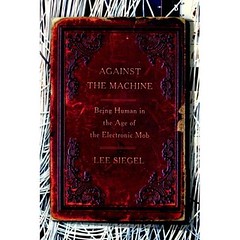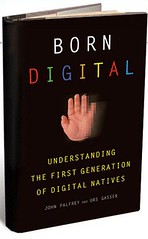Somewhere between Nick Carr’s “Typology of Network Strategies” and Chris Anderson’s “Four Kinds of Free” is the secret to understanding our new economy:
Carr’s “Typology of Network Strategies”:
- Network effect
- Data mining
- Digital sharecropping, or “user-generated content”
- Complements
- Two-sided markets
- Economies of scale, economies of scope, and experience
Anderson’s “Four Kinds of Free”:
- Direct cross-subsidy (get one thing free, pay for another)
- Ad-supported (third-party subsidizes second party)
- “Freemium” (a few people subsidize everyone else)
- “Gift economy” (people give away things for non-monetary rewards)
Of course, both Carr and Anderson are building on theories and business models previously articulated by many others. A few that come to mind:
 I just finished reading through The Economist’s new 14-page special report on cloud computing, “Let It Rise” in which Ludwig Siegele provides an outstanding overview of cloud computing and why it is so important:
I just finished reading through The Economist’s new 14-page special report on cloud computing, “Let It Rise” in which Ludwig Siegele provides an outstanding overview of cloud computing and why it is so important:
The rise of the cloud is more than just another platform shift that gets geeks excited. It will undoubtedly transform the information technology (IT) industry, but it will also profoundly change the way people work and companies operate. It will allow digital technology to penetrate every nook and cranny of the economy and of society, creating some tricky political problems along the way.
Even if you are very familiar with cloud computing, I recommend you take a look at the article. Anyway, while I was reading it, I was unsurprised to come across some comments from Nicholas Carr, whose new book The Big Switch: Rewiring the World, from Edison to Google, is essentially an early history of cloud computing and an investigation into its effects on our economy, culture, and society. And that also reminded me that, even though I have mentioned Carr’s book here several times since it was released earlier this year, I have failed to give it a dedicated review. And it certain deserves one because “The Big Switch” is easily one of the most important technology policy books of 2008.
Continue reading →
It is commonly believed that intellectual property law in the form of copyright and patent is necessary for innovation and the creation of ideas and inventions such as machines, drugs, computer software, books, music, literature and movies.
But Michele Boldrin and his coauthor David K. Levine argue that intellectual property laws are costly and dangerous government grants of private monopoly over ideas. Their book “Against Intellectual Monopoly” seeks to show through theory and example that these legal regimes are not necessary for innovation and are damaging to growth, prosperity, and liberty.
The argument that intellectual property laws actually retard progress is a fascinating challenge to conventional beliefs about their foundations and utility. At the onset of the Information Age, the role of copyright, patent, and other legal regimes in the progress of science and arts is centrally important.
The Cato Institute will be hosting a forum on Monday, November 10th that will surely be an interesting discussion of the book with coauthor Michele Boldrin, featuring commentary from Robert Atkinson, founder and president of the Information Technology and Innovation Foundation.
Register here.
 If you’re here in D.C. next Thursday, you might want to drop by the New America Foundation to watch Jonathan Zittrain and me go at it about his important new book, The Future of the Internet and How to Stop It. Our debate will take place on Thursday, November 6th from 3:30 – 5:00 p.m. at New America Foundation headquarters (1630 Connecticut Ave, NW, 7th Floor). My old friend (but frequent intellectual sparring partner) Michael Calabrese will also be speaking. Michael is the Director of New America’s “Wireless Future Program” and one of the all-around nicest guys in the world of tech policy. You can RSVP for the event here.
If you’re here in D.C. next Thursday, you might want to drop by the New America Foundation to watch Jonathan Zittrain and me go at it about his important new book, The Future of the Internet and How to Stop It. Our debate will take place on Thursday, November 6th from 3:30 – 5:00 p.m. at New America Foundation headquarters (1630 Connecticut Ave, NW, 7th Floor). My old friend (but frequent intellectual sparring partner) Michael Calabrese will also be speaking. Michael is the Director of New America’s “Wireless Future Program” and one of the all-around nicest guys in the world of tech policy. You can RSVP for the event here.
I’ve been quite critical of the thesis that Jonathan sets forth in his book, and I have discussed my reservations in a lengthy book review and a series of follow-up essays here and elsewhere.
(Part 1, 2, 3, 4, 5). We’ve also debated his book on the an NPR-Boston affiliate station if you care to hear a preview of our debate next week. That show is online here.
I encourage you to join us for what promises to be a very interesting discussion. As I pointed out in my original review of his book, if you have never had the chance to hear Jonathan speak, you’re in for a real treat. He is, bar none, the most entertaining tech policy wonk in the world.
Again, RSVP here.
Jesse Walker has a terrific feature story looking “Beyond the Fairness Doctrine” in this month’s issue of Reason magazine. I highly recommend it. It’s an in-depth exploration of what an Obama Administration means for the future of tech and media policy. Walker rightly opens the piece by noting that “The fairness doctrine is still dead, and it probably will stay dead even if Barack Obama becomes president.” The danger, however, is that an Obama FCC will still pursue a variety of onerous regulatory objectives that could do a great deal of damage to markets and free speech.
Walker touches upon the various issues that will likely be a priority for an Obama Administration and the Left-leaning media reformistas like Free Press, Media Access Project, Public Knowledge, and New America Foundation. Those policy issues include: net neutrality, “localism” mandates and increased “community oversight” regulations, media ownership rules, minority ownership requirements, increased merger meddling, spectrum policy, and other new “public interest” obligations.
Of course, as Walker also correctly points out, it is difficult to see how things could get much worse than they have been under Bush Administration’s FCC and the leadership of Chairman Kevin Martin. Walker was kind enough to quote my thoughts on this point: “Martin is the most regulatory Republican FCC Chairman in decades,” I told him. “He wants to control speech and will use whatever tools he has to get there.”
I stand by those words, but I am also aware that things could get worse — much worse — under a Democratic FCC influenced by radical Leftist activists like Free Press. Indeed, in our new book A Manifesto for Media Freedom, Brian Anderson and I inventory the many looming threats to media and technology freedom that exist today and show how most of them arise from the Left. As Walker notes in his article, however, it is unlikely that a re-empowered Democratic FCC would come right out of the gates with the same sort of command-and-control approaches they’ve employed in the past. And we’ll still have to worry about some right-of-center lawmakers and regulatory joining some of these misguided campaigns. “The real danger,” Walker concludes in his piece, “is more subtle and more mundane. It’s a bipartisan bureaucracy slowly, steadily increasing its power.” Make sure to read Jesse’s entire piece. Great stuff.
 Of the titles I included in a mega-book review about Internet optimists and pessimists that I posted here a few months ago, I mentioned Lee Siegel’s new book, Against the Machine: Being Human in the Age of the Electronic Mob. It is certainly the dourest of the recent books that have adopted a pessimistic view of the impact the Internet is having on our culture, society, and economy. Because Siegel’s book is one of the most important technology policy books of 2008, however, I decided to give it a closer look here.
Of the titles I included in a mega-book review about Internet optimists and pessimists that I posted here a few months ago, I mentioned Lee Siegel’s new book, Against the Machine: Being Human in the Age of the Electronic Mob. It is certainly the dourest of the recent books that have adopted a pessimistic view of the impact the Internet is having on our culture, society, and economy. Because Siegel’s book is one of the most important technology policy books of 2008, however, I decided to give it a closer look here.
Siegel’s book essentially picks up where Andrew Keen’s leaves off in Cult of the Amateur: How Today’s Internet is Killing our Culture (2007). I posted a two-part review of Keen’s book here last year [Part 1, Part 2], but here’s a quick taste of Keen’s take on things. He argues “the moral fabric of our society is being unraveled by Web 2.0” and that “our cultural standards and moral values are not all that are at stake. Gravest of all,” Keen continues, “the very traditional institutions that have helped to foster and create our news, our music, our literature, our television shows, and our movies are under assault as well.”
As I noted in my earlier “Net optimists vs. pessimists” essay, after reading Cult of the Amateur, I didn’t think anyone else could ever be quite as over-the-top and Chicken Little-ish as Keen. But after working my way through Siegel’s Against the Machine, I realized I was wrong. It made Keen seem downright reasonable and cheery by comparison! Keen and Siegel seem to be in heated competition for the title “High Prophet of Internet Doom,” but Siegel is currently a nose ahead in that race.
Continue reading →
Friend of TLF and chief political correspondent for CNET Declan McCullagh has a new column on CBSNews.com called “Other People’s Money.”
Nice name, but we’ll have to see whether his status as a fully decorated part of the mainstream media draws him from principled writing to constant applause for self-appointed experts who want to spend our taxed-away dollars for us.
His freshman effort looks pretty good. “Will U.S. Taxpayers Need a Bailout?” points out the perils of politically directed investments in the banking sector.
 Earlier this year, I mentioned an outstanding book that John Palfrey of the Berkman Center for Internet & Society at Harvard Law School co-edited entitled Access Denied: The Practice and Policy of Global Internet Filtering. It’s an excellent resource for anyone studying the methods governments are (unfortunately) using to stifle online expression across the globe. It’s one of the most important technology policy books of the year.
Earlier this year, I mentioned an outstanding book that John Palfrey of the Berkman Center for Internet & Society at Harvard Law School co-edited entitled Access Denied: The Practice and Policy of Global Internet Filtering. It’s an excellent resource for anyone studying the methods governments are (unfortunately) using to stifle online expression across the globe. It’s one of the most important technology policy books of the year.
Well, it looks like John Palfrey will have a second title on this year’s “Best Tech Books” list. I’ve just finished his new book with his Berkman Center colleague Urs Gasser, Born Digital: Understanding the First Generation of Digital Natives, and it is definitely worthy of your attention. In my book review posted today on the City Journal’s website, I argue that “Palfrey and Gasser’s fine early history of this generation serves as a starting point for any conversation about how to mentor the children of the Web.” It’s a comprehensive and very even-handed discussion about a variety of concerns or Internet pathologies, including: online safety, personal privacy, copyright piracy, offensive content, classroom learning, and much more.
My City Journal review is down below, but in coming weeks I will be posting some additional thoughts about some specific things in the book worthy of more attention (including a few things I disagreed with). Overall, I’d say Born Digital is a close runner-up in the race for “Tech Book of the Year,” closely trailing Jonathan Zittrain’s Future of the Internet and How to Stop It (which I have reviewed multiple times) and Nick Carr’s The Big Switch. But I found far more to agree with in Born Digital than I did in those two books. Highly recommended.
Continue reading →
 I’ve been re-reading Nicholas Negroponte’s brilliant and extraordinarily prescient 1995 book Being Digital this week, and I just came to the famous section in Chapter 12 about “The Daily Me.” It’s his visionary discussion of a future of personalized filters for all things digital to perfectly tune news and entertainment to your personal preferences. Here’s the key passage (again, remember that he wrote this in 1995, long before most of the digital things we take for granted today existed):
I’ve been re-reading Nicholas Negroponte’s brilliant and extraordinarily prescient 1995 book Being Digital this week, and I just came to the famous section in Chapter 12 about “The Daily Me.” It’s his visionary discussion of a future of personalized filters for all things digital to perfectly tune news and entertainment to your personal preferences. Here’s the key passage (again, remember that he wrote this in 1995, long before most of the digital things we take for granted today existed):
Imagine a future in which your interface agent can read every newswire and newspaper and catch every TV and radio broadcast on the planet, and then construct a personalized summary. This kind of newspaper is printed in an edition of one. […]
Imagine a computer display of news stories with a knob that, like a volume control, allows you to crank personalization up or down. You could have many of these controls, including a slider that moves both literally and politically from left to right to modify stories about public affairs.
These cotnrols change your window onto the news, both in terms of size and its editorial tone. In the distant future, interface agents will read, listen to, and look at each story in its entirety. In the near future, the filtering process will happen by using headers, those bits about bits.
Well, that future came about sooner than even Negroponte could have predicted. We all have a “Daily Me” now; it’s called our RSS feed. And there are other components to the “Daily Me,” such as iGoogle and Google Alerts, which provide automated search results served up instantaneously. And there are many other digital tools and services out there today that help us personalize our media experience.
You really gotta hand it to Negroponte for being way ahead of the curve in foreseeing all of this at a time when most of us where still using Trumpet Winsock and 14.4 modems. Hell, Al Gore hadn’t even built the Internet yet!
Peter Ferrara, offering us a taste of the dismal science for the American Spectator in reviewing a recent book’s economic predictions for an Obama Presidency (but what about civil liberties?). Hey, maybe they’ll send out more economic stimulus checks! We used ours this year to pay down a tax bill. It’s like the circle of life. (Other references to the Lion King will be swiftly and severely dealt with).





 I’ve been re-reading Nicholas Negroponte’s brilliant and extraordinarily prescient 1995 book
I’ve been re-reading Nicholas Negroponte’s brilliant and extraordinarily prescient 1995 book  The Technology Liberation Front is the tech policy blog dedicated to keeping politicians' hands off the 'net and everything else related to technology.
The Technology Liberation Front is the tech policy blog dedicated to keeping politicians' hands off the 'net and everything else related to technology.